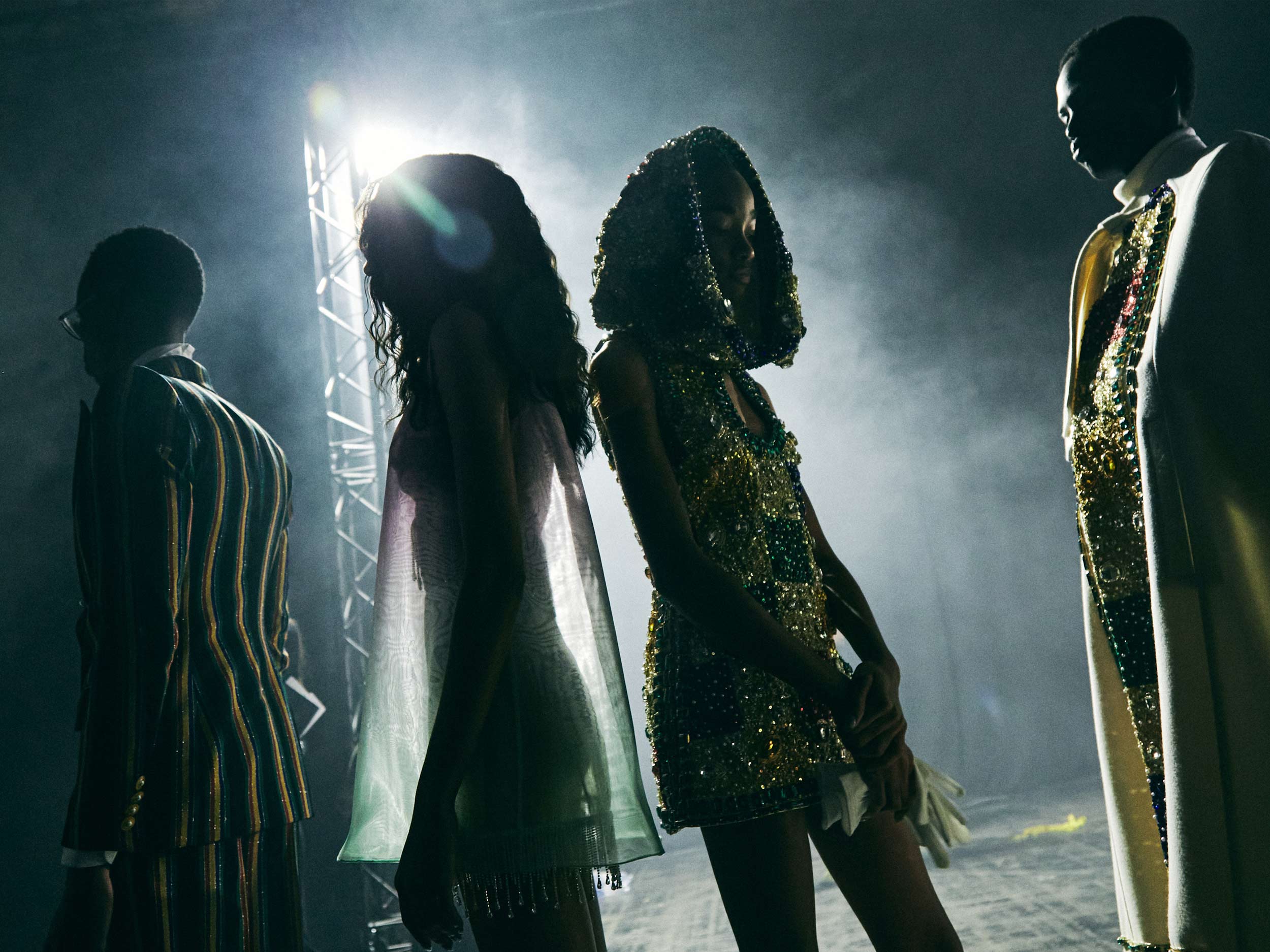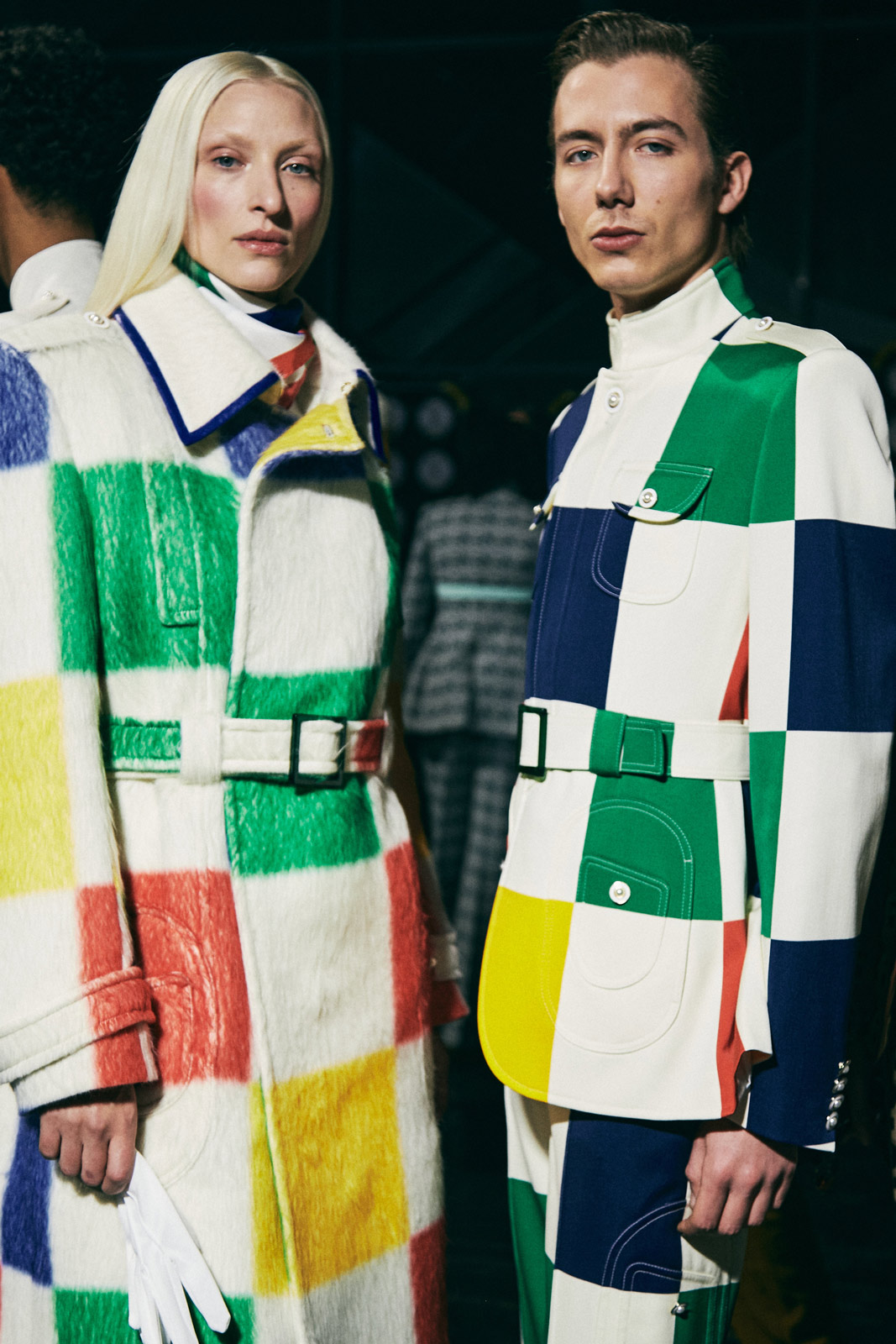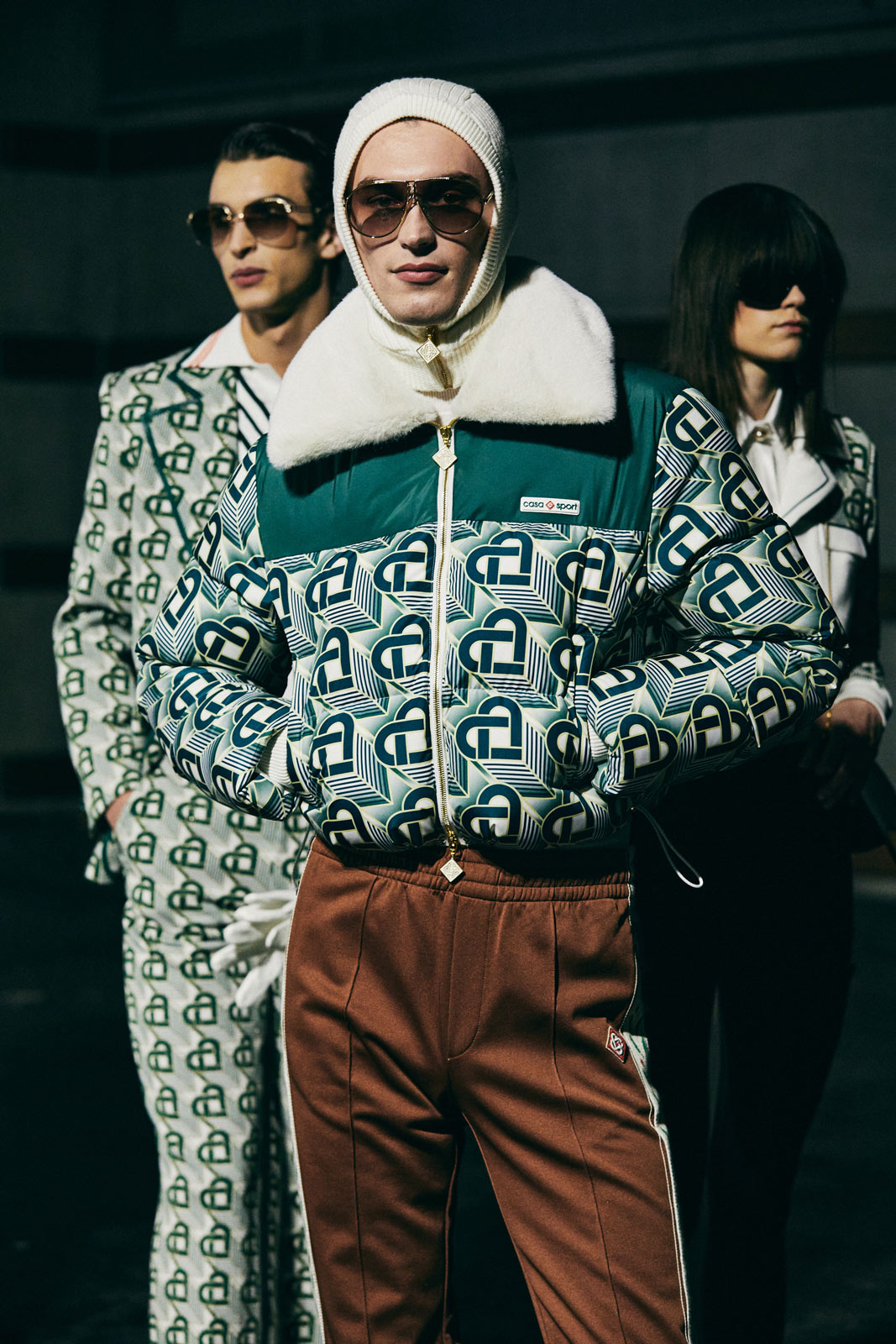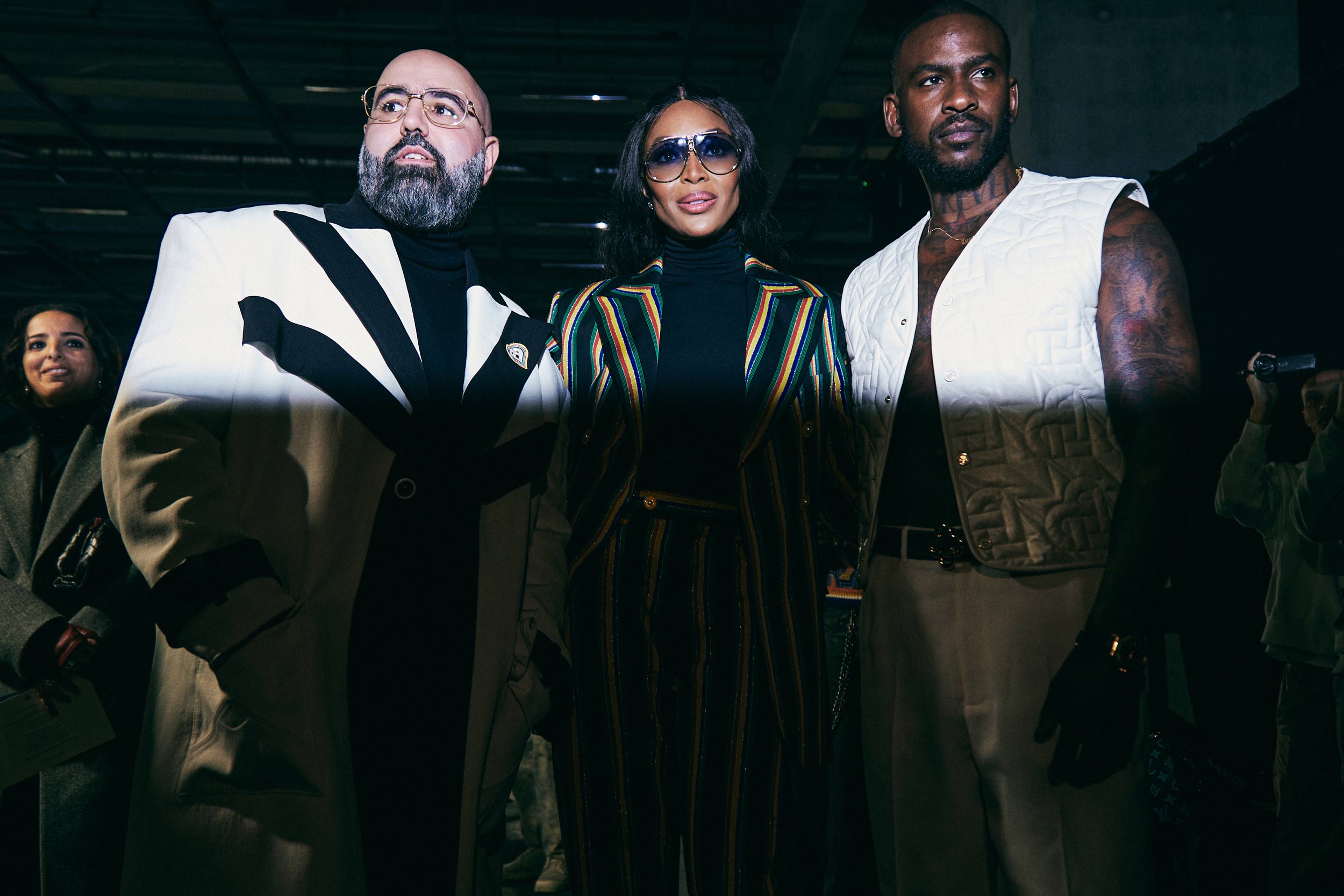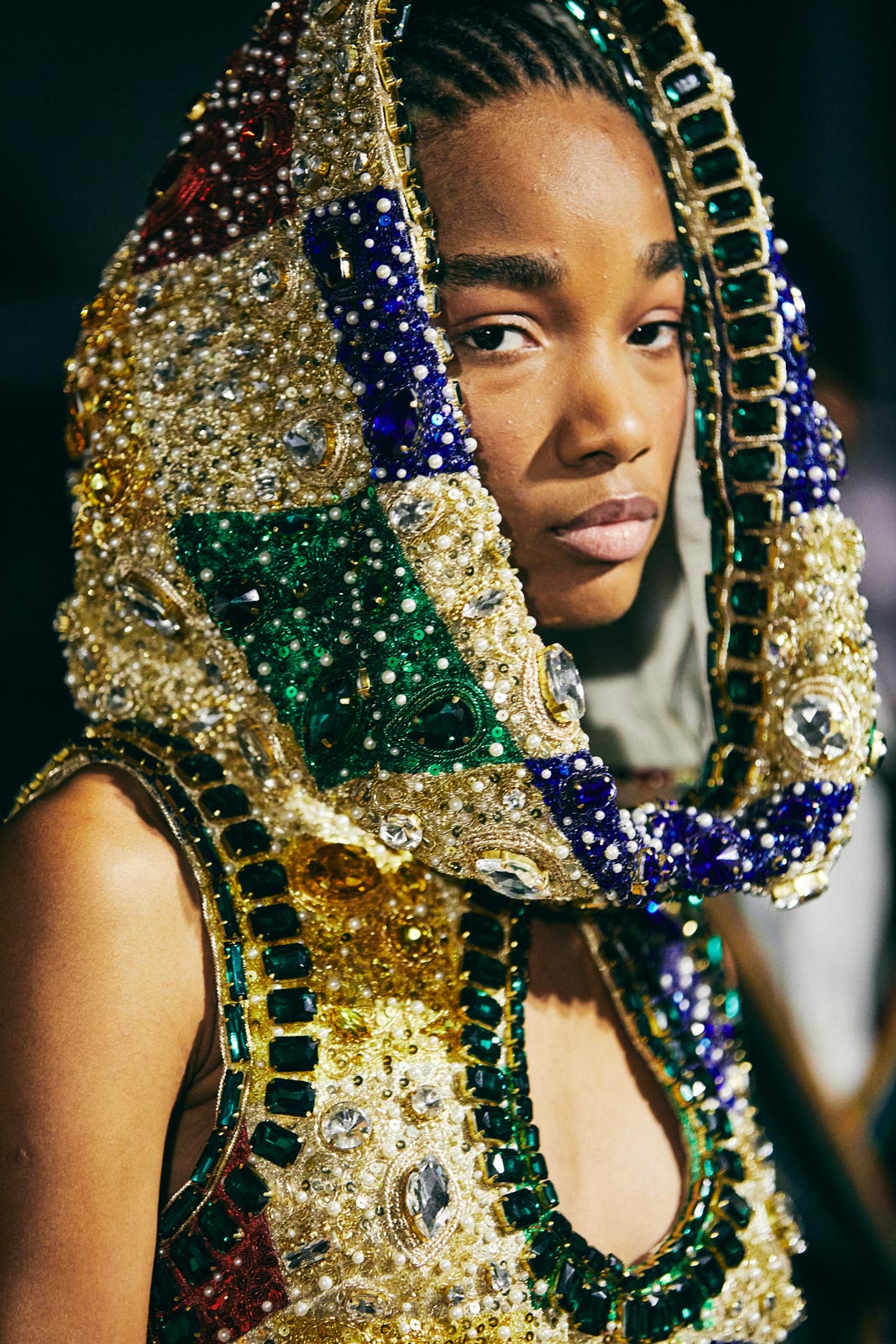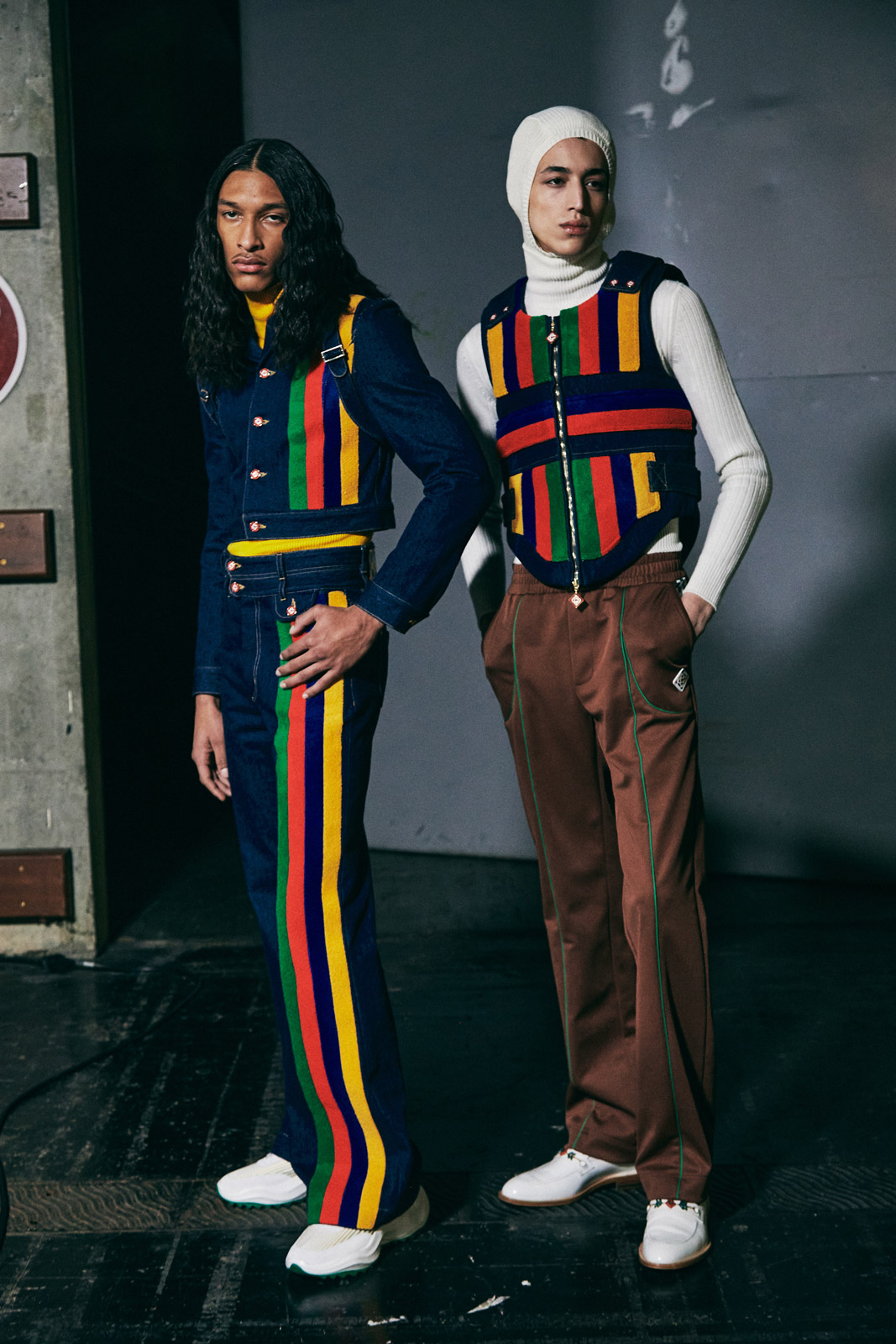Ahead of their joint Paris Fashion Week debut, the pair met with Document to speak to the origins of the perception-shifting label
Charaf Tajer is a global force. Paris-born with Moroccan heritage, his brand Casablanca blends influences from both regions to create a new vision for luxury. As a finalist for the LVMH prize in 2020, and having completed a collaboration with Bulgari last year, Tajer’s profile continues to rise.
As much as he champions fashion, the designer is an equal believer in utilizing his platform to call attention to issues of global consequence. Enter Casablanca’s Fall/Winter 2023 Paris Men’s Week show. In a massive, starkly decorated convention center, Tajer began his presentation with a speech spotlighting the ongoing war in Syria, and specifically the power and beauty of the youth who fight to experience joy and beauty among a conflict that much of the world has turned its back on.
Making her runway debut soon after was Syrian activist Yusra Mardini, who first rose to prominence as a member of the Refugee Olympic Team during the Rio games in 2016. Beyond her intensive athletic background, Mardini is a person of incredible strength and conviction, helping to save passengers on a sinking migrant ship while departing from Syria in 2015, after a near-disaster off the coast of Greece.
Document sat down with Tajer and Mardini shortly before Casablanca’s show to explore the broader message of unity and peace embedded in the collection’s bold and hopeful colors—highlighting not only the presence of conflict, but also the greater resilience and beauty of the Arab world.
Colin Boyle: Thank you for finding the time to sit down—especially because the show is in just a few minutes. I think a natural starting point would be to talk about where you found inspiration for the collection.
Charaf Tajer: A few months ago, my friend Maya, [who] is from Syria, told me this story. I was like, How is the youth in Syria? I’m someone who is always very [interested in] youth culture. I believe in the idea that the youth is the future, in physical form. She starts telling me about this group of people who party during the war. I was so touched by it. It was under the danger of bombs and all that. I found it to be the most beautiful thing in the world—because who has the courage to do things like this? I decided to dedicate this collection to them as a way to shine light on the story. I mean, if I was a singer, I probably would do a song. But I’m a designer.
I went to Damascus, and I went to those parties. I met people from every different class, but they all were [doing] the same thing. It gave me even more confidence that it was the right thing to do. They have more gratitude than us in Europe. They have very hard conditions of life, but they still have a lot of positivity.
Colin: And Yusra will be in the show, and there’s great creative energy between you two. How did you connect for the first time?
Yusra Mardini: On Instagram. [His team] explained to me that this collection is for peace. And I’ve been advocating for that concept since, you know, 2015 or 2016, since I left home. The collection is so special; it brings this light of color. When you talk about the Arabic world, it’s always like this: areas where there’s gray, and [things are] destroyed. And I feel like [Charaf] said, the youth—the Arabic youth—is trying to change that perception.
[We’re] trying to say, Okay, yes, we went through a lot. But here we are—we’re still trying, we want to be creative. I love fashion. I’m here because I’m a refugee myself, and also from a creative side—this is my first show. So I’m very excited. And I think it was perfect that I am doing it with Charaf, because he has an Arabic background and there’s a meaning behind the show.
Colin: Yusra, you mentioned this grayness, and color is something that you address a lot in your work, Charaf. How does it factor into your perspective on fashion?
Charaf: My instinct always goes to color. The colors that surrounded me were a big part of the manifestation of Casablanca. I felt like fashion was missing stories, colors, and prints. This is what I wanted to see, and the story I wanted to create.
Fashion, in general—for the last 15 years or more—had a point of view that everything should be kind of monochromatic. We at Casablanca came with a lot of colors, so people thought we didn’t know how to talk about the codes of fashion.
Colin: When you were thinking about the more political implications of the collection, did you have anything specific in mind?
Charaf: It is a hundred percent focused on unity and peace. I was following the life of Yusra in the past; I’ve followed her for a year or two on social media, and she inspired me. I think being an Arab in this world has a connotation—every time you hear someone speaking about Muslims or about Arabs, it always comes with negativity after. So for us to embody our identity—it’s harder for us to live in Europe or America, but it’s also a great pride. Sweet contradiction.
But to answer your question about politics: I wanted to just focus on one thing, peace. This is where we get lost in the conversation: Who’s right and who’s wrong? It’s very [much about] ego. I wanted, with this collection, to give the message that peace is the most important thing. When I was in Syria—and whenever I post something about Syria—so many Syrian people tell me, Thank you for not forgetting us. Because they felt like they were forgotten by the international community. This is probably the worst thing in the world: to feel like you’re not part of your own conversation.
Colin: Yusra, how do you feel wearing the collection? Especially walking in the show itself.
Yusra: It’s very new. I’m trying to walk confidently in heels. I think I’m gonna go with boots in the end. I am someone who’s really in love with fashion. And my mom, actually—you don’t know this [Charaf], but my mom was a designer. A very small one, but she used to design our clothes for Eid.
It brings me so much joy, knowing that people still think about Syria and want to do more about it—because after 10 years of war, it’s become normal. It’s not a trend. You have to work towards making the world a peaceful place. Whether it’s through art, whether it’s through a sport, which I did—it’s a strong message to me, because it shows me that as an athlete, as a refugee, I can do something.
Colin: What’s next for you? Coming from athletics, now you have this fashion exposure—what are you thinking about moving forward?
Yusra: Honestly, I’m doing everything in the moment. As I said, I would love to work more shows. And I just launched my own foundation, which focuses on helping refugees through sports and education. I am also studying in LA at USC, film and TV production. So maybe I’ll be a producer one day, or a director—who knows!
I’m still working with refugees, for refugees. I still work with UNHCR. In general, I’m doing what I do. Minus the swimming. I still swim, I went twice to the Olympics, though—what do I want more than that? I achieved my first big goal. Since I was nine years old, I dreamt of being at the Olympics. And actually, the colors for this show, most of them are in the Olympic rings, as well.
Charaf: That was where we took them from, exactly. We thought it was quite cool as a unity symbol, without being so direct. Sports are a unifier. It doesn’t matter where you are, where you’re from. It kind of pulls it all together.
Colin: And Charaf, what would you say is next for Casablanca? Where are you moving with this collection, and in the future?
Charaf: I mean, we have more and more confidence in who we are. The more the time goes on, the more fashion understands who we are.
Colin: And is there anything, after the show, that you want to do for the Syrian cause?
Charaf: Of course. We’re doing a project with women from a tribe [in the] north of Syria, who live kind of secluded. [Yusra] has a foundation, so we’re gonna work through that
Yusra: We have a lot of ideas. I think the future is very bright for the brand. I really like it. And I’ll always be a supporter, from now on.
Also, bringing awareness to Paris is very, very important. Because obviously, there are lots of refugees coming to France. I am on the Paris Peace Forum, and I want to try to change the perspective here. A brand like Casablanca can shift the narrative. We might have gone through a lot. But again, here we are, and we’re positive—we want to make a change in the world. We want to inspire who gets inspired, you know, whether they’re refugees or not. Whether they’re Arabic or not. And I think the show’s gonna do that tonight.


